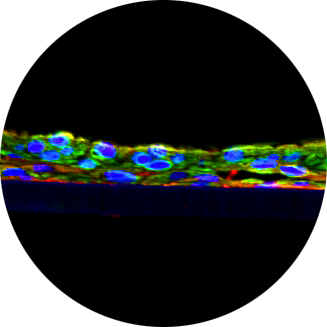Human Tissue Models
Mattek's lab-grown human epithelial tissues are living, metabolically active 3D tissue models that provide greater insight into clinical outcomes. Utilized by scientists and researchers for safety and efficacy in the cosmetic, personal care, pharmaceutical, and chemical industries, Mattek tissues provide the largest and most diverse selection of lab-grown human organs available.
EpiOral™ & EpiGingival™
Personal care and pharmaceutical companies rely on Mattek’s oral mucosal models to evaluate their raw materials and final product formulations.
EpiCorneal™
The EpiCorneal 3D human tissue model provides a highly predictive non-animal alternative to assess ophthalmic drug delivery, wound healing and tissue regeneration, disease modeling (e.g. dry eye) and corneal infection.
EpiOcular™
EpiOcular’s exceptional reproducibility provides scientists with quantifiable assessments of irritation. Its correlation to in vivo sensitivity makes it an ideal in vitro alternative to in vivo testing for toxicological evaluation of raw materials and final formulations.
EpiNasal™
Mattek’s human 3D lab-grown nasal tissue model is redefining preclinical testing in the areas of viral research, toxicology, inflammation, and permeation.
EpiAirway™
EpiAirway is a cutting-edge, lab-engineered human airway tissue model that replicates the cellular structure and function of the human respiratory system. Designed for advanced research, it is ideal for studying respiratory diseases, drug delivery, and the effects of airborne substances on the lungs. EpiAirway offers a precise and ethical alternative to animal testing, enabling more accurate and human-relevant insights into airway health.
EpiAlveolar™
EpiAlveolar, modeling the alveoli at the end of the human respiratory tree, was engineered to provide human-relevant results in an easy-to-use in vitro system. EpiAlveolar mimics human biological responses and provides a unique platform to test inhalation exposure and mechanisms for viral respiratory infection.
EpiLiver™
Mattek’s human 3D lab-grown liver model is disrupting the clinical drug research space as an easy-to-use, physiologically active hepatic organotypic model.
EpiKidney™
EpiKidney is a state-of-the-art, lab-grown human kidney tissue that mimics the cellular structure and function of human renal proximal tubules. EpiKidney provides a reliable and ethical alternative to animal testing, offering more precise insights into kidney health and drug safety.
EpiIntestinal™
Mattek’s novel innovation to help redefine gastrointestinal preclinical testing, EpiIntestinal is a lab-grown human 3D small intestinal tissue model with epithelial polarity to evaluate toxicity, metabolism, drug absorption and compound efficacy.
EpiVaginal™
EpiVaginal provides an lab-grown research tool for feminine product safety testing, drug development and for the study of HIV-1 and other sexually transmitted diseases. Human-like 3D tissue structure and cellular physiology make it ideal for toxicology, drug delivery and formulation efficacy testing.
EpiDerm™
EpiDerm is an advanced, lab-grown human tissue model designed for cutting-edge research and testing in dermatology and skincare. Mimicking the structure and function of human skin, it offers a reliable and ethical alternative to animal testing, providing accurate insights into skin responses. With multiple regulatory validations, EpiDerm is ideal for studying skin reactions, drug efficacy, and cosmetic product safety.
EpiDermFT™
Mattek’s advanced 3D full thickness model of human skin takes preclinical testing to the next level by providing a physiological means to evaluate early molecular markers of efficacy. Trusted by cosmetics formulators and skin biologists worldwide to provide human-relevant insight into physiological responses to topical and systemic exposure.
MelanoDerm™
Mattek’s advanced lab-grown 3D co-culture skin model incorporates human melanocytes into a well differentiated epidermal tissue. Evaluate novel skin lightening agents in vitro with the leading pigmented skin model.
Psoriasis
A lab-grown 3D diseased tissue model of Psoriasis to screen therapeutic candidates for safety and efficacy.
Melanoma
A lab-grown tumor model of melanoma enables cancer researchers a better understanding of disease progression, and is a platform for testing new therapies.
EpiAirway is a cutting-edge, lab-engineered human airway tissue model that replicates the cellular structure and function of the human respiratory system. Designed for advanced research, it is ideal for studying respiratory diseases, drug delivery, and the effects of airborne substances on the lungs. EpiAirway offers a precise and ethical alternative to animal testing, enabling more accurate and human-relevant insights into airway health.
EpiAlveolar, modeling the alveoli at the end of the human respiratory tree, was engineered to provide human-relevant results in an easy-to-use in vitro system. EpiAlveolar mimics human biological responses and provides a unique platform to test inhalation exposure and mechanisms for viral respiratory infection.
The EpiCorneal 3D human tissue model provides a highly predictive non-animal alternative to assess ophthalmic drug delivery, wound healing and tissue regeneration, disease modeling (e.g. dry eye) and corneal infection.
EpiDerm is an advanced, lab-grown human tissue model designed for cutting-edge research and testing in dermatology and skincare. Mimicking the structure and function of human skin, it offers a reliable and ethical alternative to animal testing, providing accurate insights into skin responses. With multiple regulatory validations, EpiDerm is ideal for studying skin reactions, drug efficacy, and cosmetic product safety.
Mattek’s advanced 3D full thickness model of human skin takes preclinical testing to the next level by providing a physiological means to evaluate early molecular markers of efficacy. Trusted by cosmetics formulators and skin biologists worldwide to provide human-relevant insight into physiological responses to topical and systemic exposure.
Mattek’s novel innovation to help redefine gastrointestinal preclinical testing, EpiIntestinal is a lab-grown human 3D small intestinal tissue model with epithelial polarity to evaluate toxicity, metabolism, drug absorption and compound efficacy.
EpiKidney is a state-of-the-art, lab-grown human kidney tissue that accurately mimics the cellular structure and function of human kidneys. EpiKidney provides a reliable and ethical alternative to animal testing, offering more precise insights into kidney health and treatment efficacy.
Mattek’s human 3D lab-grown liver model is disrupting the clinical drug research space as an easy-to-use, physiologically active hepatic organotypic model.
EpiOcular’s exceptional reproducibility provides scientists with quantifiable assessments of irritation. Its correlation to in vivo sensitivity makes it an ideal in vitro alternative to in vivo testing for toxicological evaluation of raw materials and final formulations.
Personal care and pharmaceutical companies rely on Mattek’s oral mucosal models to evaluate their raw materials and final product formulations.
EpiVaginal provides an lab-grown research tool for feminine product safety testing, drug development and for the study of HIV-1 and other sexually transmitted diseases. Human-like 3D tissue structure and cellular physiology make it ideal for toxicology, drug delivery and formulation efficacy testing.
Mattek’s advanced lab-grown 3D co-culture skin model incorporates human melanocytes into a well differentiated epidermal tissue. Evaluate novel skin lightening agents in vitro with the leading pigmented skin model.
A lab-grown tumor model of melanoma enables cancer researchers a better understanding of disease progression, and is a platform for testing new therapies.
Mattek’s human 3D lab-grown nasal tissue model is redefining preclinical testing in the areas of viral research, toxicology, inflammation, and permeation.
A lab-grown 3D diseased tissue model of Psoriasis to screen therapeutic candidates for safety and efficacy.
Ready to advance your science?
Our team is ready to provide a cost-free consultation to determine how we can help you reach your research and testing goals. Contact our team of experts today.

